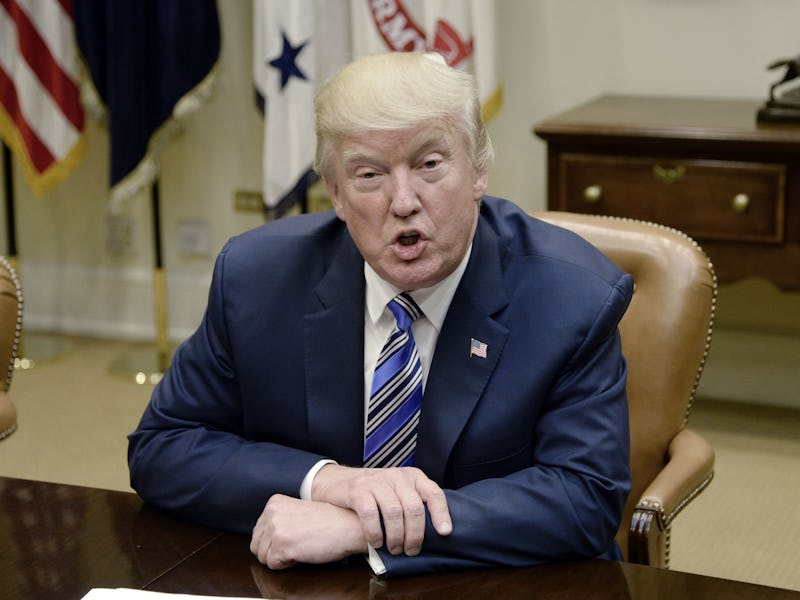Trump's Tweets Just Went From Bad to Unconstitutional: Here's Why
He might be sued.

President Donald Trump’s Twitter account had a very bad day on Tuesday. After White House Press Secretary Sean Spicer defined Trump’s tweets as “official statements” during a press briefing, lawyers issued Trump a legal challenge, asserting that it’s unconstitutional for him to block citizens from his Twitter feed.
The president’s spokespeople often argue that his tweets should not be taken seriously, but Spicer gave reporters a different assessment: “The president is the president of the United States, so they’re considered official statements by the president of the United States,” he said.
Later in the day on Tuesday, the Knight First Amendment Institute — a Columbia University-based legal group — issued President Trump a letter asking him to unblock the accounts of citizens who have expressed opposing views to the president without violating Twitter’s terms of service. Trump frequently blocks users who tweet messages at him that are mocking or adversarial.
Private citizens on Twitter may block whomever they please, but it is less clear whether a public figure may legally do so. In February, the ACLU successfully compelled the governor of Maryland to unblock users who had criticized him on his Facebook page.
So what’s the stated legal justification for this?
The letter from the Knight First Amendment Institute argues that Trump’s Twitter account “constitutes a designated public forum,” because it is meant for sharing “information and opinions relating to government policy with the public at large, and in which members of the public can engage you, engage one another, and sometimes elicit responses from you.”
The legal challenge was likely written before Spicer’s statement, but his classification of the tweets as “official statements” can only make it more difficult for the Trump administration to argue that his account is not a public forum.
It is unconstitutional to deny citizens access to a public forum simply because they express a dissenting opinion, the letter declares.
“Blocking users from your Twitter account violates the First Amendment. […] This is true even if the space in question is ‘metaphysical’ rather than physical; even if the space is privately rather than publicly owned; and ‘even when the limited public forum is one of [the government’s] own creation.’ The government may impose reasonable time, place, and manner restrictions in a designated public forum, but it may not exclude people simply because it disagrees with them.”
The notice implies that the Knight First Amendment Institute could sue the president if he does not unblock the users he unconstitutionally barred from his feed.
Dan Scavino Jr., the director of the president’s social media, tweeted out a baffling reaction to the institute’s letter a few hours after it was sent.
This could mean that Scavino plans to force Trump to unblock those users, but the strange phrasing (Trump “will not stop” — as opposed to start — communicating with the whole country) indicates that Scavino more than likely misunderstands the letter.
It remains to be seen whether or not the institute will actually sue Trump if he does not acquiesce. Regardless, this is a big development: It was bad enough when Trump’s Twitter habits were controversial and destructive, but now they’re also violating the Constitution.